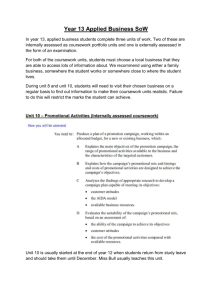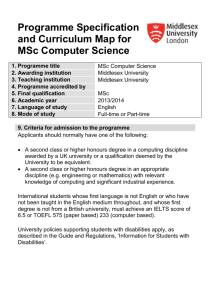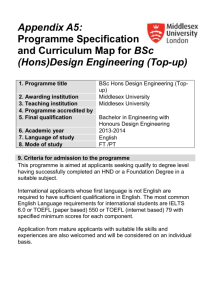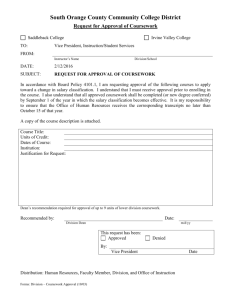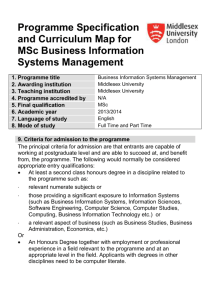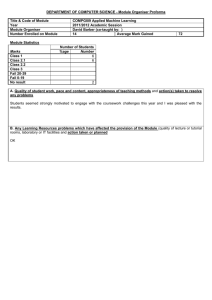Programme Specification
advertisement
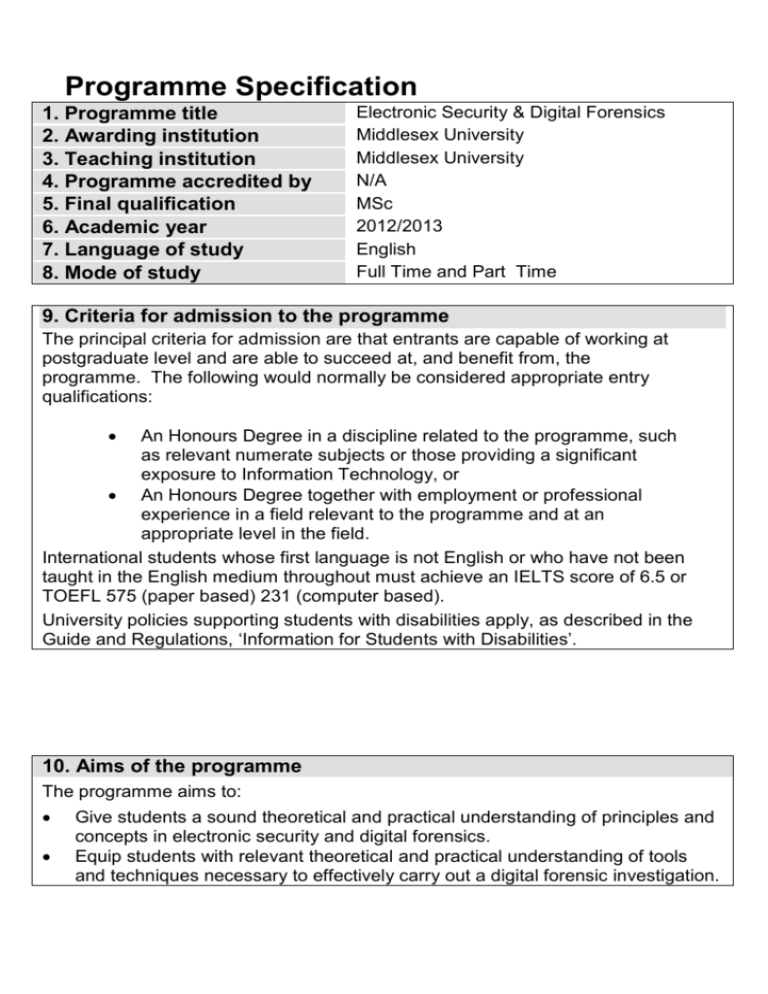
Programme Specification 1. Programme title 2. Awarding institution 3. Teaching institution 4. Programme accredited by 5. Final qualification 6. Academic year 7. Language of study 8. Mode of study Electronic Security & Digital Forensics Middlesex University Middlesex University N/A MSc 2012/2013 English Full Time and Part Time 9. Criteria for admission to the programme The principal criteria for admission are that entrants are capable of working at postgraduate level and are able to succeed at, and benefit from, the programme. The following would normally be considered appropriate entry qualifications: An Honours Degree in a discipline related to the programme, such as relevant numerate subjects or those providing a significant exposure to Information Technology, or An Honours Degree together with employment or professional experience in a field relevant to the programme and at an appropriate level in the field. International students whose first language is not English or who have not been taught in the English medium throughout must achieve an IELTS score of 6.5 or TOEFL 575 (paper based) 231 (computer based). University policies supporting students with disabilities apply, as described in the Guide and Regulations, ‘Information for Students with Disabilities’. 10. Aims of the programme The programme aims to: Give students a sound theoretical and practical understanding of principles and concepts in electronic security and digital forensics. Equip students with relevant theoretical and practical understanding of tools and techniques necessary to effectively carry out a digital forensic investigation. Equip students with relevant knowledge, procedures and skills necessary for digital forensic investigations especially relating to computer incidents and computer misuse. Equip students with knowledge of legal and professional issues relevant to computerrelated crime, digital evidence and forensic investigations. Equip students with relevant knowledge of principles and concepts in information security management. Develop critical, analytical and intellectual abilities of students by nurturing creative and independent thinking, and the ability to communicate clearly and coherently. 11. Programme outcomes A. Knowledge and understanding On completion of this programme the successful student will have knowledge and understanding of : 1. Tools and techniques necessary for carrying out digital forensic investigations. 2. The nature, collection and handling of digital evidence in a forensic investigation. 3. Methods and techniques for the analysis of digital evidence 4. Electronic crime investigation frameworks, guidelines and procedures. 5. Legal and professional issues related to computer-related crime, digital evidence and digital forensic investigations 6. Principles and concepts of information security management. Teaching/learning methods Students gain knowledge and understanding and develop cognitive skills and abilities through self directed, resource based learning, small group discussions, small group and individual exercises, lab sessions, demonstration software, on-line examples and the research project. Weekly seminar sessions supported by the Local Study Centre Tutor(s) provide the opportunity to address questions, queries and problems. Throughout their studies students are encouraged to undertake independent study both to supplement and consolidate what is being learnt and to broaden their individual knowledge and understanding of the subject. Critical evaluation and selection of methods, tools and solutions engage the students in relating theory to practice. Assessment Method Individual coursework, presentations, the unseen examination and the project thesis assess students’ knowledge and understanding. B. Cognitive (thinking) skills On completion of this programme the successful student will be able to: 1. Apply relevant tools and techniques to carry out a digital forensic investigation. 2. Investigate, collect and analyse relevant digital evidence from computing devices including mobile platforms. 3. Advise on proper procedures for the handling, use and presentation of digital evidence. 4. Advise on relevant legal and professional issues related to computer-related crime, digital evidence and digital forensic investigations. 5. Manage information security procedures and processes. 6. Analyse information security problems and implement effective solutions as an individual or in cooperation with others C. Practical skills On completion of the programme the successful student will be able to: 1. Select and use a variety of modes of discourse for effective communication according to the needs of the intended audience. 2. Perform effectively as a member of a team in complex and diverse working environments. 3. Demonstrate a critical understanding of, and the ability to Teaching/learning methods Students develop practical abilities through the teaching and learning programme outlined above. These abilities are also nurtured through small group discussions, small group and individual exercises, laboratory sessions, demonstration software, on-line problemsolving examples and the research project. Assessment Method Students’ practical abilities are principally assessed through coursework reports and the thesis report, with examination questions addressing aspects of practical abilities as appropriate to the subject material. Teaching/learning methods Students learn transferable skills through the teaching and learning programme outlined above. Although not all the skills are explicitly taught, they are nurtured and developed throughout the programme, which is structured and delivered in such a way as to promote this process. Assessment Method deploy effectively, a wide range of learning methods resources and technologies, including, but not limited to, Information and Communication Technologies. 4. Manage their own learning and development autonomously, demonstrating time management and organisational skills at a professional level. 5. Demonstrate self-direction and originality in learning and problemsolving in familiar and unfamiliar situations. 6. Appreciate the need for continuing professional development in recognition of the need for lifelonglearning. Outcome 1 is assessed through coursework and examination, presentations and the project report. Outcome 2 is assessed through coursework. Outcome 3 is assessed primarily through examinations. Outcome 4 is assessed through coursework Outcomes 5 and 6 are assessed primarily through the research project report. Outcomes 6 and 7 are assessed through individual coursework involving critical analysis and presentation of relevant D. Graduate Skills On completion of this programme the successful student will be well equipped for a career in the rapidly expanding fields of Digital Forensics and IT Security Management. Teaching/learning methods Students acquire graduate skills through the teaching and learning programme outlined above. Assessment method Students’ graduate skills are assessed by individual and/or group coursework, and unseen examinations. 12. Levels and modules Starting in academic year 2010/11 the University is changing the way it references modules to state the level of study in which these are delivered. This is to comply with the national Framework for Higher Education Qualifications. This implementation will be a gradual process whilst records are updated. Therefore the old coding is bracketed below. Level 7 (4) COMPULSORY Students must take all of the following: BIS4600: Legal and Professional Aspects of Digital Forensics PROGRESSION REQUIREMENTS Students may not commence BIS4992 until they have obtained 120 credits, i.e. they must pass all taught modules. BIS4605: Digital Evidence Management and Forensic Processes BIS4610: Information Security Management BIS4615: Digital Investigation and Digital Technology. BIS4992: Postgraduate Computing Project 12.1 Non-compensatable modules (note statement in 12.2 regarding FHEQ levels) Module level Module code 7 BIS4992 13. A curriculum map relating learning outcomes to modules See Curriculum Map attached 14. Information about assessment regulations Information on how the University formal assessment regulations work, including details of how award classifications are determined, can be found in the University Regulations at http://www.mdx.ac.uk/regulations/gradecriteriaguide.aspx Practical aspects of the programme are often assessed via coursework that may be carried out using specialist software and may include lab tests. Theoretical material is assessed by coursework and examinations. Grades are awarded on the standard University scale of 1–20, with Grade 1 being the highest. To pass a module all components, both coursework and examination, must be passed individually with a minimum grade of 16. Failure in one of the components will result in the failure of the module. For additional information on assessment and how learning outcomesare assessed please refer to the individual module narratives for this programme. 15. Future careers (if applicable) All programmes in the School of Science and Technology – their curricula and learning outcomes – have been designed with an emphasis on currency and the relevance to future employment. The majority of graduates are employed in IT posts relevant to the subject. Over 20% of students pursue further postgraduate study or research. The employer links with the School are encouraged in a number of ways e.g. by inviting practitioners from industry as guest speakers in lectures; through links with companies where students are employed as part of their Industrial placement and through alumni both in the UK and overseas Campus Careers Offices can be found on each campus for advice, support and guidance – or go to http://www.mdx.ac.uk/campus/support/careers/index.asp 16. Particular support for learning (if applicable) The School’s Teaching and Learning Strategy is compliant with those of the University, in seeking to develop learner autonomy and resource-based learning. In support of the students learning experience: All new students go through an induction programme and some have early diagnostic numeric and literacy testing before starting their programme. Learning Resources (LR) provide workshops for those students needing additional support in these areas. Students are allocated a personal email account, secure networked computer storage and dial-up facilities New students are provided with a hard copy of the schools Subject Handbook at enrolment (electronic copies for all students can also be found at UniHub. Soft copies of all module handbooks can be found online. Web-based learning materials are provided to further support learning Extensive library facilities are available on all campuses. This is available as learning resources through the My Learning Portlet system High-quality specialist network, software, digital and wireless laboratories equipped with industry standard software, hardware and tools as appropriate, for formal teaching as well as self-study. Middlesex University is a Cisco Local Academy and a Xilinx University partner Access to campus based teaching and learning support drop in sessions, arranged by the school to provide assistance and guidance Tutorial sessions for each module organised for groups of up to 20 students are provided for additional teaching support Formative feedback is given on completion of student coursework Past exam papers with solutions and marking schemes for all modules are available for students in module handbooks and at UniHub Research activities of academic staff feed into the teaching programme, which can provide individual students with ad-hoc opportunities to work with academics on some aspect of research Middlesex University encourages and supports students with disabilities. Some practical aspects of Science and Technology programmes may present challenges to students with particular disabilities. You are encouraged to visit our campuses at any time to evaluate facilities and talk in confidence about your needs. If we know your individual needs we’ll be able to provide for them more easily. For further information contact the Disability Support Service (email: disability@mdx.ac.uk) 17. JACS code (or other relevant coding system) 18. Relevant QAA subject benchmark group(s) G500 Computing 19. Reference points The following reference points were used in designing the programme: QAA Framework for Higher Education Qualifications in England, Wales and Northern Ireland QAA Computing subject benchmark statement Towards Benchmarking Standards for Taught Masters Degrees in Computing (sponsored by CPHC), May 2004 QAA/CLQE guidelines for programme specifications QAA Code of Practice for the assurance of academic quality and standards in HE University Policy, Regulations and Guidelines Middlesex University and School of Science and Technology Teaching Learning and Assessment policies and strategies. Please note programme specifications provide a concise summary of the main features of the programme and the learning outcomes that a typical student might reasonably be expected to achieve if s/he takes full advantage of the learning opportunities that are provided. More detailed information about the programme can be found in the student programme handbook and the University Regulations.

